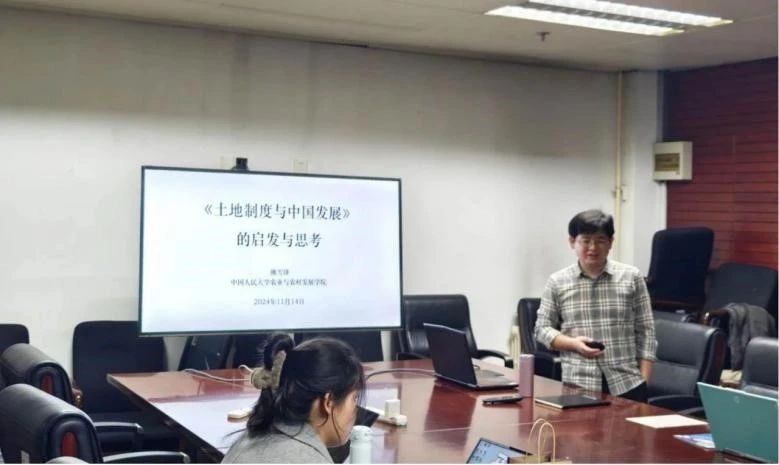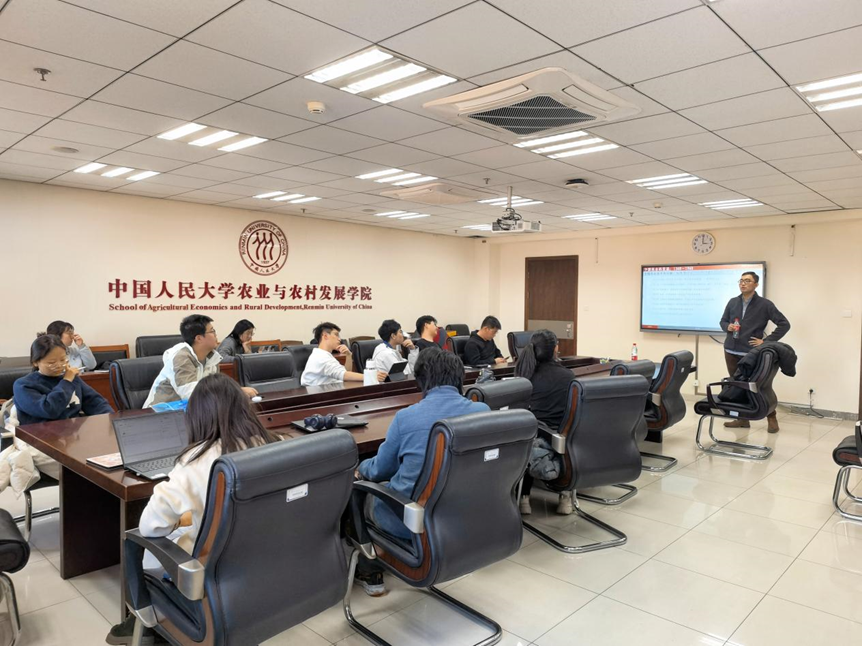
Excellence program in agriculture, rural areas and farmers · Academic Governance 丨"Agricultural Economics Tea House" Series of Reading Sessions
Editor's Note: Renmin University of China is committed to the fundamental task of cultivating virtue and talent. In response to the demand for interdisciplinary knowledge structures in addressing real-world issues, it aims to tackle the problems of superficial reading habits and declining focus caused by changes in information dissemination methods. Considering the long-term nature and slow variables of talent cultivation, the university has organized and targetedly implemented the "Advancing Learning and Cultivating Virtue" reading program. The goal is to use books as a bridge to facilitate the exchange of knowledge, personnel, and ideas. Through systematic reading, students can enrich their knowledge structures; through immersive reading, they can internalize knowledge and develop logical critical thinking skills. Within a training system that integrates literature and history, connects past and present, and fosters mutual learning between East and West, the program promotes students' mental and physical well-being, broadens their thinking, strengthens their roots and souls, and enhances their confidence.
To implement the "The 2024-2035 Master Plan on Building China into a Leading Country in Education" and to further promote reading among young students, the Academic Affairs Office has launched the "Reading Plan · Reading Club Project Tour" to foster a love for reading, the ability to read good books, and the skill to read effectively throughout the school. This initiative aims to showcase the measures and achievements, as well as the unique features and highlights of reading club projects across all colleges (departments) and colleges.
Introduction to the "Agricultural Economics Tea House" Series of Reading Sessions
The "Agricultural Economy Tea House" reading series is a distinctive brand activity of the School of Agricultural Economics and Rural Development at Renmin University of China's "Excellence in Agriculture · Academic Governance " series. It is also one of the key projects under the school's first "Learning and Moral Cultivation" reading program. The series has been widely welcomed by students after multiple sessions. Since its launch, the reading series has centered on the core concept of "Reading Classics · Reflecting on Agriculture, Rural Areas, and Farmers," focusing on classic issues and academic frontiers in these fields. It invites experts and scholars from both inside and outside the university to discuss agricultural economics with students, promoting interdisciplinary thinking through a format that combines theoretical explanations with interactive discussions.
The 2024 "Agricultural Economics Tea House" series, structured around the theoretical framework of "agriculture, rural areas, and farmers studies," hosted three thematic events. Using a "history–structure–mechanism" research framework, it connected in-depth interpretations of classics including The Measure of Civilization, Land Systems and Chinese Development, and The Development of Chinese Agriculture: 1368–1968. The activities impacted undergraduate, master’s, and doctoral students across disciplines, attracting over 60 participants university-wide and forming an academic community characterized by "bridging through books and connecting through thought."

Project Construction Measures and Highlights
"The Agrarian Economy Tea House" uses the six-dimensional dialectical thinking of "history and contemporary, domestic and international, economics and management, fishing and fishing, critical thinking, and practical application" as a bond to construct a complete educational chain of "classic reading—method training—cross-disciplinary innovation—critical practice." In the future, the reading club will continue to deepen its educational logic of "reading classics, strengthening foundations, emphasizing innovation, and promoting practice," cultivating new talents in rural studies who possess both profound academic expertise and keen real-world insight.
I. "History" and "Present": Integrating Historical Context, Decoding Modern Agriculture
The reading group will revolve around three levels: "history—structure—mechanism." By combining historical classics such as "The Development of Chinese Agriculture: 1368-1968" with contemporary studies like "Land Systems and Chinese Development," it aims to guide students in seeking modernization insights from traditional agrarian civilization. For example, by analyzing the evolution of agricultural productivity from the Ming Dynasty to modern times, it explores the historical logic of land system reforms in current rural revitalization efforts, achieving a leap in thinking that applies history to the present and uses the past to inform the future.

II. "China" and "World": Grounded Local Practice, Expanded Global Vision
The book club focuses on placing China's rural issues within a global context for consideration. "The Measure of Civilization: How Social Development Determines National Destiny" introduces a comparative framework of global civilizations to analyze the uniqueness of traditional Chinese agrarian society; Professor Xiong Xuefeng shares his findings and insights based on local cases, such as his involvement in the land reform experiment in Luxian County, Sichuan; "The Development of Chinese Agriculture: 1368-1968," which studies Chinese practices, serves as a source that supports the renowned California School of thought both at home and abroad. This model of "mutual learning between China and the West" helps students transcend single perspectives and develop more inclusive research thinking.

III. "Economics" and "Management": Breaking Disciplinary Barriers, Sparking Interdisciplinary Innovation
The book club is grounded in economics to achieve interdisciplinary research perspectives and talent cultivation. For instance, in the discussion on "Land Systems and China's Development," economics students analyze the efficiency of resource allocation under institutional changes, public administration students explore the grassroots logic of policy implementation, and agricultural management students focus on optimizing farmer behavior... The collision of different case analyses forms an interactive model of "diverse viewpoints clashing—common issues distilled—innovative solutions explored," truly realizing "interdisciplinary reading and cross-disciplinary growth."
IV. "Giving the Fish" and "Teaching Fishing": Imparting Knowledge Essence, Cultivating Research Ability
Book clubs aim not only to "give a man a fish" but also to "teach him how to fish"; they should both "grasp the big picture and understand the logic" and "focus on refining and perfecting details." Professor Zhai Runzhuo analyzed historical national economic accounting methods through "The Development of Chinese Agriculture"; Professor Xiong Xuefeng shared field investigation and empirical research approaches based on "Land System and Chinese Development: 1368-1968." —— Book clubs, while interpreting content, place greater emphasis on methodological instruction, achieving a closed loop from "empowering the classroom" to "assisting self-study"; students, in addition to increasing their knowledge through learning-oriented reading, should also improve their thinking through research-oriented reading, realizing a qualitative transformation from "knowledge acquisition" to "ability generation."
V. "Critical Thinking" and "Debate": Cultivating Critical Awareness, Activating Academic Discourse
Book clubs encourage the exchange of ideas between teachers and students, motivating students to challenge authoritative theories. In the discussion on "The Development of Chinese Agriculture: 1368-1968," students questioned whether population growth inevitably leads to agricultural internal competition, using examples of agricultural technological innovations during the Ming and Qing dynasties to refute classic conclusions. Professor Xiong Xuefeng guided students to reflect on the logic of local government behavior from the perspective of "land finance dependence," encouraging them to consider the flaws and hidden issues in land systems throughout history. Thought is the foundation of debate, and debate sharpens thought; the combination of reflection and discussion in the Agricultural Economics Tea House cultivates students' ability to think independently and express themselves critically.
VI. "Theory" and "Practice": Anchoring Theoretical Foundations, Empowering Real-World Engagement
The book club focuses on the theoretical framework of "agriculture, rural areas, and farmers studies," linking this theory to practical issues such as rural revitalization and urban-rural integration. The theme "Land System and China's Development" analyzes the relationship between land systems and China's development from both longitudinal and horizontal perspectives. By tracing history, it reveals the profound mechanisms behind how changes in China's land system have driven economic growth, summarizing the "land-based development" model. It further delves into the potential risks and problems of this model in reality, elevating theory to guide practice within the closed loop of "practice → theory → practice."

